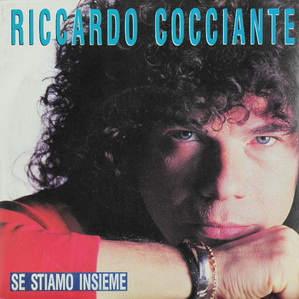
Se stiamo insieme is a 1991 Italian song written by Riccardo Cocciante (music) and Mogol (lyrics) and performed by Riccardo Cocciante.
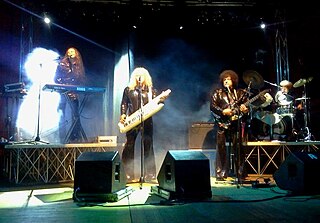
I Cugini di Campagna is an Italian pop band formed in 1970 in Rome. They are well known for the use of falsetto and for their eccentric look, a cross between glam and kitsch.
"Vecchio frac" is a 1955 song written by Italian singer-songwriter Domenico Modugno.

"Una casa in cima al mondo" is a 1966 Italian song composed by Vito Pallavicini and Pino Donaggio. The song premiered at the 16th edition of the Sanremo Music Festival, with a double performance by Donaggio and Claudio Villa, and placed at the fourth place.

"Adesso sì" is a 1966 Italian song composed by Sergio Endrigo. The song premiered at the 16th edition of the Sanremo Music Festival, with a double performance by Endrigo and Chad & Jeremy, and placed eight in the competition.

"Adesso tu" is a 1986 Italian song composed by Eros Ramazzotti, Piero Cassano and Adelio Cogliati and performed by Eros Ramazzotti. The song won the 36th edition of the Sanremo Music Festival.
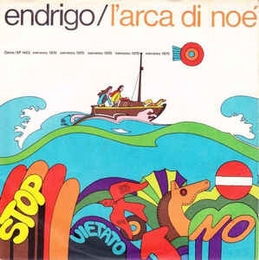
"L'arca di Noè" is a 1970 song composed by Sergio Endrigo. The song premiered at the 20th edition of the Sanremo Music Festival, with a double performance by Endrigo and Iva Zanicchi, and placed at the third place.

"Il nostro concerto" is a 1960 Italian song composed by Umberto Bindi (music) and Giorgio Calabrese (lyrics). The song premiered at the Italian Music Festival in New York, in which was performed by Miranda Martino and placed third. It eventually was Bindi's major hit, whose version topped the Italian hit parade for several months.
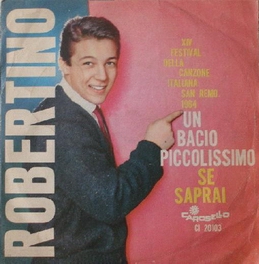
"Un bacio piccolissimo" is a 1964 song composed by Giovanni Ornati and Gino Mescoli. The song premiered at the 14th edition of the Sanremo Music Festival with a double performance of Robertino and Bobby Rydell. Robertino's version was sung with a fake English accent according to the fashion of the time.

"Uomini soli" is a 1990 song composed by Roby Facchinetti and Valerio Negrini and performed by the Italian musical group Pooh. The song won the 40th edition of the Sanremo Music Festival, where it was also performed in an English-language soul adaptation titled "Angel of the Night" by Dee Dee Bridgewater.

Disperato is a 1990 song composed by Marco Masini, Giancarlo Bigazzi and Giuseppe Dati and recorded by Marco Masini. The song won the newcomer section as well as the critics award at the 40th edition of the Sanremo Music Festival.

"Perdere l'amore" is a 1988 song composed by Marcello Marrocchi and Giampiero Artegiani and performed by singer Massimo Ranieri. The song won the 38th edition of the Sanremo Music Festival, and marked the return to music of Ranieri after a decade devoted to acting.
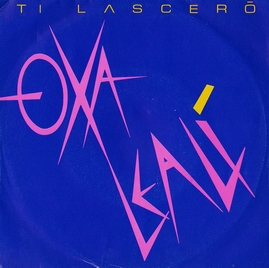
"Ti lascerò" is a 1989 song composed by Franco Fasano, Fausto Leali, Franco Ciani, Fabrizio Berlincioni and Sergio Bardotti, arranged by Fio Zanotti and performed by Anna Oxa and Fausto Leali. The song won the 39th edition of the Sanremo Music Festival, and the duo Oxa-Leali was subsequently chosen to represent Italy at the Eurovision Song Contest 1989.
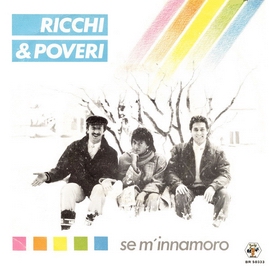
"Se m'innamoro" is an Italian song composed by Cristiano Minellono and Dario Farina, arranged by Fio Zanotti and performed by the Europop group Ricchi e Poveri. The song won the 35th edition of the Sanremo Music Festival.

"Nessuno" is a 1959 Italian song composed by Antonietta De Simone and Edilio Capotosti. The song premiered at the ninth edition of the Sanremo Music Festival, with a double performance by Wilma De Angelis and Betty Curtis, and placed at the eighth place.

"Solo noi" is a 1980 song composed and performed by Toto Cutugno. It won the 30th edition of the Sanremo Music Festival.

"Sentimento" is a 2000 song composed and performed by Piccola Orchestra Avion Travel. It won the 50th edition of the Sanremo Music Festival. Their Sanremo victory raised some controversy, as it was heavily determined by the quality jury, whose votes made the song rise from the 11th place to the first place.

"Confusa e felice" is a 1997 song composed and performed by Carmen Consoli.
"Come saprei" is a 1995 song co-written and recorded by Giorgia. It won the 45th edition of the Sanremo Music Festival.
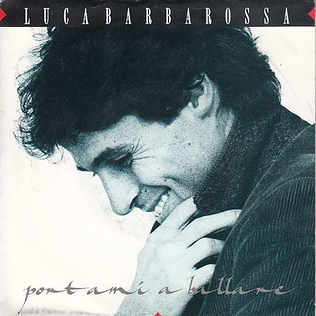
Portami a ballare is a 1992 Italian song written and performed by singer-songwriter Luca Barbarossa.

















